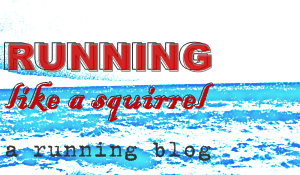Not Impossible: The Providence Marathon 2014 (Race) Report. Part B
Also read Not Impossible: The Providence Marathon 2014 (Race) Report. Part A or whatever.
The half-marathoners dominated the porta potty lines when the anthem was sung, and I stood among them.
Shit. I missed the start.
Who cares, I have the best legs in New England. I start when I want to start.
I’ll start with the half-marathoners.
I’d be the only one wearing a green bib.
Eh. Better than starting the race 3 minutes late, by myself.
I quit the bathroom line and started the race 3 minutes late, by myself. A helicopter was filming an aerial close-up to embarrass me to death. Bewildered, I ran in denial for 16.5 miles, then I started to drip. We cool. Black spandex. No one can see that my pants are wet. A woman called out to me: “Nice and steady. Looking Great.” I waved to her and nodded. Am I right?! Then I entered a deeper stage of denial. Think of the big picture: a 4-hour finish. A guy on a bicycle came toward us as I made a left turn onto Vintner. “Way to pee!” he cheered. I’m not sure that was what he said, but I saw porta potties at the corner on Wannisett and I went in. My race was over.
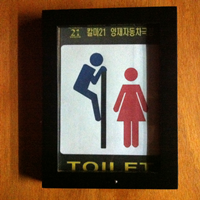
At Mile 18, at the start of an unshaded stretch of the bike path, I decided to not stop to refill my bottle. I quickly ran out of water. Sunday was a sunny day, unlike when I ran there on Friday. The wind was stronger on Sunday too — a 29.90 MPH northeast headwind — which rendered my sunscreen insufficient. I often bet against the sun and the wind; sunscreen feels like wearing another layer of clothing and I don’t like it. I miscalculated, and I was also wrong about not getting water at Mile 18. There was no water until Mile 21 and the promised hills did not exist either. Instead there was an undocumented hill, a more severe hill, at Mile 21. And there was Mile 23: an undisclosed cobblestone promenade, hidden from street traffic and obscured from the satellite imagery of Google Earth. Are you fucking kidding me?! Who puts cobblestones on a race course? Everything was terrible and I lost clarity, but the real victims were the spectators.
At Mile 21, where the bike path meets Veterans Memorial, a bunch of college-type brethren were watching me ascend the Goliath slope; they had wit and hotness and words for my nipples. “It’s getting cold,” one of them said. It wasn’t getting cold. I didn’t look back or laugh. I was sandblasted, I was thirsty, I was sun-washed. I’m sorry.
I saw you somersault in your front yard, little girl. You are making the world a better place. I’m sorry I ignored you.
Sir, I saw you sitting on the curb, strapped to a baby, monitoring the wheels of a stroller and another baby. You looked optimistic. I’m sorry I didn’t say hi, or smile. I’m sorry I didn’t hug you.
Ma’am, I saw you calling out, “2-1-9-7! You look great!” I was dumbly apathetic. I’m sorry I didn’t thank you.
I heard you at Mile 24: “Two and a quarter! It will be shorter! You will be surprised!” Seriously, girlfriend, I don’t know what that means. What a thing to say.
There was an accident. A man and a bicycle were lying in the grass and an ambulance had arrived and parked on the median between the highway and the trail. I kept running, forcing the sight to fade away, thinking of the uncanny biker who had been following me. I saw him every two miles; every two miles, I would run past him where he would be standing by his bike, in his helmet, biding his time, acting as if he hadn’t been following me. I didn’t see him after my bathroom break at Mile 17.
“Because people look at the clouds,” his ex girlfriend, Abigail, said to Dr. Thackery on The Knick. “Don’t look at the clouds, John.”
I hated the romantic cobblestones.
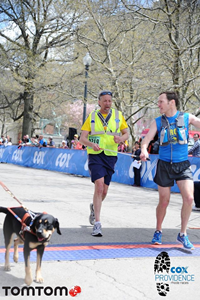
Randy Pierce (left) and Thor Kirleis
Photo © TomTom / Cox Providence Rhode Races
The last five miles were familiar. There, on Valley Street, was the other side of the Dare Devil Dive where I ran in Mile 4 behind the blind runner and his guide. “SLOWING,” the guide said. “MANHOLE COVER in three… two… one…” Then: “CONES,” he announced. “Don’t push, just let it pull you.” They were holding the ends of a 2-foot tether, keeping an invariable constancy between them. I had just passed them and stepped on a bump in the asphalt when the guide said, “A little BUMP.” The blind man recited the names of the streets as though he was reading a map to someone on the phone. “Valley Street,” he said, “highway underpass.” They were focused, they were ready. I was awestruck. I turned to them and sneaked a smile and a ‘good job,’ and the blind runner said, “Left turn in 400 yards. And that’s Mile 4.”
“You’re the best guide I had,” he said to his guide. “You’re the first guide I had.”
“Tell me at Mile 20 if I’m a good guide,” the guide said.
That hill was steeper than a ramp in a parking garage underneath a high-rise building, and on the way back, in Mile 23, my legs refused to run it. I felt very small.
But I didn’t go to New England to break four hours. I wanted to go to the museum at ‘Risdee,’ the Rhode Island School of Design, where people who have artistic ability go to learn, like David Sedaris’s sister Gretchen. I also had to buy a new t-shirt at the Boston University Bookstore, a red-on-white short-sleeve to match my car sticker. And I needed to have an espresso at Dwelltime in Cambridge — the best coffee in New England.
I didn’t do any of that. I went for a drive and observed the user experience of motorcyclists across three states. Rhode Island riders, unlike moto heads in New Hampshire, don’t wear helmets and they don’t communicate in turn signals; in Rhode Island, safe distance is for losers. Boom.

The American Classic Arcade Museum, Laconia, New Hampshire
I listened to Marketplace on NHPR and drove north to the American Classic Arcade Museum in Laconia, where I spent all my tokens on PAC-MAN. A little boy was pacing behind me. You can play when I die, I told him in my head. Then his dad said, “Let’s find something else,” steering his son away; a sturdy lad from New Hampshire, he understands. For in my work of genius he recognizes his own rejected thoughts, for we abide by our spontaneous impression with good-humored inflexibility. On the way south from heaven, I stopped at a gas station in Manchester to buy a lottery ticket for the Mega Millions. I haven’t checked my ticket yet. I still can.
On Sunday I had dinner at North on Carpenter Street. I was able to find parking in Luongo Square, the hub of a residential neighborhood, where houses wear wood molding and layers of trim in contrast colors. North was in the blue house, across from the purple house, next door to the red house. I reached for the door handle when a guy clad in all-black rushed to block my way with a clipboard in his hand.
“You have to sign a release,” he said.
He was repping for the BBC’s Million Dollar Critic — a new reality show. They would be filming me chewing, they might say things, I might mutter about things. You can’t have any pudding if you don’t sign our release. Inside, everyone was acting natural, talking into their phones and not making eye contact. The bar area in the front was chock-full of diners. In the dark I could see a mobile spotlight on a stick following a man with a fuzzy field microphone through a disjointed arrangement of tables. The back room is the size of a living room; there was nowhere to stand comfortably without getting in someone’s way.
“It’s an hour wait,” someone called in my direction. I said okay. “Maybe less for one,” he added.

The Avery
I bartered my phone number for his name and advice to wait across the street at The Avery — a local hangout with a melancholy theme. I walked over, sat at the bar, gawked at the nude art that bedecked the wall, and ordered a ginger ale every time the man on my left ordered a beer. In the corner, a tattooed woman with a lackluster voice was telling her boyfriend that her girlfriend was moving to Los Angeles, then John from North called and interrupted the misery; he said I should go over, they had an open seat.
There were six cramped, wooden barstools; whoever sat down first would pilfer a few inches of space, until the last two wiggly chairs remained inaccessible. John waved to me and in the direction of the two open seats. The BBC camera was rolling. It then moved outside to zoom in on the bar area through the front window.

Million Dollar Critic’s filming crew in Providence at North
By the time I made it onto the chair, the seat on my right had an occupant — another solo diner, whom I didn’t see enter the restaurant, or wait by the door, or struggle to climb the barstool. He greeted me and immediately started a conversation from the middle. I soon discerned that he was God. His name is Richard. He is an accountant. He works from home. He always comes to North when his friends are in town. His voice is deep and slow and mildly accented; he sounds like John Koudounis from Mizuho Securities or someone who has a podcast about tuning of upright pianos. His skin color is dark maple and his thick hair is wavy and black.
Richard told me that he imported a Thermomix from Canada in his suitcase and I said I ran a marathon — what you should say when you talk with God. We both ordered Dan Dan Noodles: the freshest wide noodles, dancing in a red sauce with ground goat meat and chunks of squid and chilies. I also ordered a warm mushroom dish: beech mushrooms, which were roasted, then dressed in thai basil and buttermilk egg yolk sauce. North could have saved that sauce had they dared to break the law of small plates and bring out the mushroom dish by itself. I described its phenomenal sauciness to Richard as I was witnessing the buttermilk suddenly coagulate and cool and die.
Small plates are a boon to eaters. They outdo big plates, they keep you focused, they let you eat cheesecake and oysters side by side and optimize your good time. The best bite is the first bite, everyone knows that. Pickled ginger — the artificer of sushi brilliancy — knows that, tricking our palates into deeming each piece of sushi the first piece of sushi. But the best bite is the second bite, of course. Seconds are taken for love, and love bests everything.
The buttermilk mushroom dish does not belong on a small-plate menu, I’m just saying.
Richard doesn’t like runny eggs and doesn’t eat fish and shellfish often. He grew up in Trinidad; he wasn’t exposed to seafood as a child and hasn’t grown into liking it. We talked about our love for espresso.
“No good coffee in Providence,” Richard said, “nothing like Cafe Intelli-hentsia,” he mispronounced the name.
“You know about Intelligentsia!” I was entranced. “They make a good espresso.” We agreed.
“Yes,” he said, “my daughter studied art at Columbia College. Dwelltime in Cambridge,” he went on, “the best espresso in Boston. Better than Intelli-hentsia,” Richard said.
I ordered a pineapple coffee cake, which was ill-fated. It had roasted pineapple and coffee and ice cream and almond streusel — it was materially confused. I told Richard that the other night I ate pastries for dinner.
“Pastiche.” He knew.
“Yes,” I confessed.

Pastiche Fine Desserts & Café
I waited twenty minutes for a table at Pastiche, sitting outside on Spruce Street on the lovers’ bench, watching the after-party throng of Federal Hill. I wanted hot chocolate but I didn’t want to lose the bench. Therefore I started an unmemorable conversation with a standby couple on a first date. She had coffee in a paper cup, he had three unbuttoned buttons in his shirt, I had the bench. I read to them from the menu of Cakes and Tarts and Cookies by the Pound, and when my table was ready, I was ready too. The hostess removed utensils and glassware to set up the scene for a single diner who wasn’t going to share. Then a waiter brought carrot cake and hot chocolate and a Russian teacake with pecans, a rugelach with currants and walnuts, and also a lemon curd square that was half-baked, and a chocolate truffle.

Chocolate truffle, Russian teacake with pecans, lemon curd square, and rugelach with currants and walnuts at Pastiche Fine Desserts & Café
It was past midnight when I finished at Pastiche and I wanted dessert. I asked the hostess where I could get a decent slice of pizza. “Oh, wow. Sicilia’s,” she said. She was falling in love with me. “The. Best.” she added. I strode to the other side of DePasquale Square, as she directed, turned left and crossed the street. “Sicilia’s,” the sign read, “Stuffed Pizza Chicago Style.” Because Providence is uncompromising.
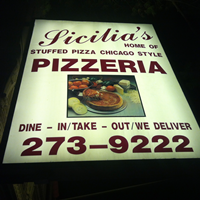
“These things have a reason,” Richard said and launched a browser on his phone. He waxed ardently about the existence of mobile search tools, “the enablers of productive conversations,” he theorized. He sent me to visit a book shop on Plympton Street devoted entirely to poetry. “Go to Grolier,” he said. “Every time you’re in Boston.” Then, rhetorically, he added, “and the Harvard Book Store.”
Four hours in marathoning is mothafucka badass, like 100 IBU’s in beer and Windows 10 in Windows. People who can’t run a 4-hour marathon are irrelevant to society. My training data put me at a 3:55 finish; “Not impossible,” they said. And I believed them. Because failing is good for me. Failing has made me give up on things and quit them forever, like that time when I wanted to be a stained-glass artist.
Wearing winter layers and half-finger training gloves, I stood on the balcony of my apartment holding a wheel cutter. I scored piece after piece of one-of-a-kind glass, snapped it like a useless princess, turning it into trash. And after quitting stained glass for good, I now cut glass like a boss. I control where the break happens, I copper foil the curves, flux the seams, run my soldering iron on the other side; I grind, I fine-tune, I readjust, and I don’t use gloves. I own stained glass.
The day before the race, I watched Born to Explore on Discovery Channel. Richard Wiese followed a craftsman in India through his process of block printing on fabric. “It is good to know,” Wiese said, “there are places in the world people care to do work with passion.” And later that day, at the marathon expo, I met Mike and Dave, the founders of Janji. They make v-neck t-shirts, which are the hardest kind of t-shirts to make. Their fabrics aren’t spineless, their shapes are not trying to slim or lengthen. Their graphics flirt their way from the fronts to the sides. Mike and Dave bring water to people who love water, and they bring t-shirts to people who love t-shirts.
It’s all craft. Running is a craft. I decided to run a 3:55 marathon when the Dumbass Partners came on ESPN after the Kentucky Derby and talked about their decision to win the Triple Crown. They didn’t win. We all didn’t win.
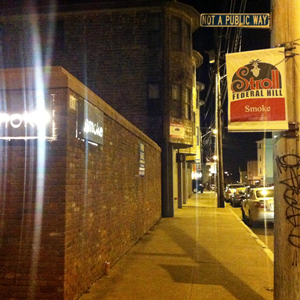
Federal Hill, Providence
I had one chance to get this right — one pre-race dinner. I rarely eat dinner at 6 p.m. in the afternoon, all the same, what would Jordan Belfort do? I sat by the window at the NYLO hotel with my back to the river and interpreted the couple that walked into the dining room. The girl repeatedly flattened her flat hair with her hand, mindlessly; she was obsessing on how steadily she walked in her new platform sandals. It was their first getaway weekend — a checklist item on her to-do. This is fun. It’s fun, right? she rephrased an answer as a question in her head. The boyfriend seemed impatient, his plaid shirt untucked, his hair wet; he wanted to stay in bed, he didn’t want to take a shower. He put his hands in his front jean pockets and pulled them out as he was eyeing the TV behind the bar. She was deciding what time they would finish dinner, if to wear the white short-sleeve for lunch tomorrow or the pink tank top. He asked the waitress to change the channel; the Pacers were playing the Hawks at home, it was Game 7.
I perused the menu, making mental bookmarks. I doubted they would have anything fermented. The table on my left clinked their four glasses of wine. The world needs more kombucha, more sauerkraut, a better tofu. I ordered my legumes, protein, greens, and chocolate milk; the waitress walked to the kitchen to place my order and before long, she walked back. “Just making sure,” she said, revealing the lack of congruence in my food order, “you also wanted the hummus, correct?” She was tall and pretty, with long, brown hair with wavy, copper hues. Polite reticence washed over her and softened her frame with gracious aplomb. I said yes, I also wanted the hummus.
“I’m running a marathon in the morning,” I gave her an explanation. “Covering all the food groups.”
She was relieved. “Absolutely,” she said and stayed standing by my side. “I don’t run,” she said. She paused, and then added, “I can run 3 miles.”
“I love running here,” I said.
“I volunteered at a mud race this morning,” she told me.
“Ah, fun,” I was hooked. “Where was it?” I asked.
“Scarborough Beach. I helped with the waves, it was a lot of fun. I’m all sunburnt now.”
“Yes. The wind and the clouds, it’s deceiving,” I said. I worried about my sunscreen.
“Would you like a straw for the chocolate milk?” she asked. Then she went to brief the kitchen.
She brought the pasta, she brought the Brussels sprouts, she brought the black beans.
“And just checking,” she said, “you still want the hummus, yes?”
I relished the shrimp and the pesto and penne; I left the pita chips uneaten and the olives in the bowl. Someone else’s waitress sauntered by my table, looking, then finally turned to me and said: “You go loading up.” I was famous.
I didn’t want anything on the dessert menu. I wanted more fiber and more dairy and I wanted strawberries.
“Hold on,” my pretty waitress said. She said she’d be right back.
She walked to the other side of the room and leaned through the opening in the wall to talk with Chef David about me. I unfolded the course map that I brought to dinner and read it one more time. My waitress came back.
“Okay,” she reported. “We can make fresh strawberries with custard…” She tilted her head and narrowed her eyes, that is to say, personally, she would have definitely picked fresh strawberries with custard. I said nothing. I wanted to know what Chef David had said next. Professional chefs, like advertising creatives, use this technique when they pitch an idea: The last item they present is an extemporaneous disclosure, a sliver of their heart, it’s what they love. The last article is not there to sate the desire — it’s their biometric signature.
“Or…” she continued, “we can do strawberries and whipped cream.”
“That,” I said. “Strawberries and cream.”
Not Impossible: The Providence Marathon 2014 (Race) Report. Part A
Inspiration:
Run The Jewels – 36″ Chain
Nirvana – Come As You Are
Eminem – Lose Yourself
Joey Bada$$ – No. 99
SomeKindaWonderful – Reverse
Pink Floyd – Another Brick in the Wall
Kendrick Lamar – The Blacker the Berry
Laurie Berkner – Victor Vito
The Return of the Blue and Gold by Dan Sweeney. American Way, May 2014, Vol. 47 No. 09
The Chicken Sisters! by Cathy Booth Thomas. American Way, May 2014, Vol. 47 No. 09
The Wolf of Wall Street / screenplay by Terence Winter
Audrey Niffenegger
Me Talk Pretty One Day / David Sedaris
Self-Reliance / Ralph Waldo Emerson
Six Amazing Foods for Cleansing your Colon Naturally by Ethan A. Huff
Photos © Nurit Pazner or respective owner.



